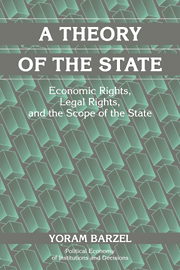Book contents
- Frontmatter
- Contents
- Preface
- 1 Introduction
- I The Emergence of Protection and Third-Party Enforcement
- II The Emergence of Legal Institutions
- 9 Legal Rights
- 10 The State's Enhancement of Market Trade
- 11 The Size and Scope of the State
- III The Character of the State
- References
- Index
- Other Books in the Series
11 - The Size and Scope of the State
Published online by Cambridge University Press: 04 December 2009
- Frontmatter
- Contents
- Preface
- 1 Introduction
- I The Emergence of Protection and Third-Party Enforcement
- II The Emergence of Legal Institutions
- 9 Legal Rights
- 10 The State's Enhancement of Market Trade
- 11 The Size and Scope of the State
- III The Character of the State
- References
- Index
- Other Books in the Series
Summary
As argued earlier, the size of the state as well as its scope will depend primarily on two sets of scale factors: protection and third-party enforcement. Because I do not have much to contribute to the topic of economies to protection, I touch it only briefly. I then elaborate more fully on the economies to third-party enforcement, arguing that governing on behalf of its clients, the rule-of-law state will pursue activities in which it has a comparative advantage, rather than using sheer “power.” The state has a comparative advantage in contract enforcement. State protection is especially useful for impersonal exchange, and for that reason it is complementary to contract enforcement. Contract enforcement is subject to scale economies. In the penultimate section of this chapter, I argue that the reason certain empires were created was to form a large area subject to a single ultimate enforcer in order to take advantage of these economies.
SCALE ECONOMIES TO PROTECTION
The economies of scale to protection seem to affect mostly the size rather than the scope of the state. They consist of simple economies of scale and of the gain from consolidation to internalize what otherwise would be external effects of protection. The dominant scale economies seem to arise in operations against outsiders. One example of scale economies is where a large force can overwhelm a small one at a low cost to the large force. That probably would be the case in a battle where the battleground was in open terrain. Another example is that of a radar installation that covers a territory encompassing the holdings of many individuals. Economies of scale to internal protection are also available, but seem to be less extensive than those to external protection.
- Type
- Chapter
- Information
- A Theory of the StateEconomic Rights, Legal Rights, and the Scope of the State, pp. 198 - 214Publisher: Cambridge University PressPrint publication year: 2001



